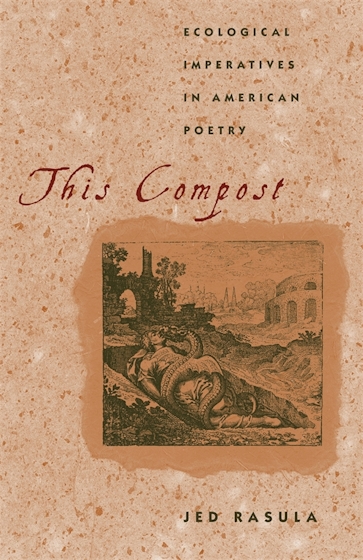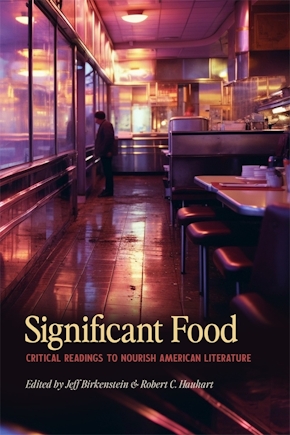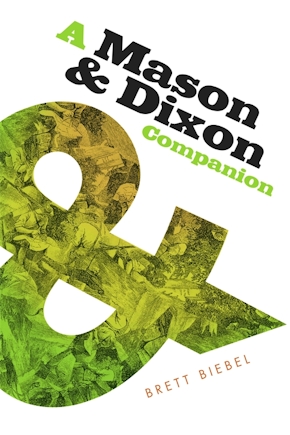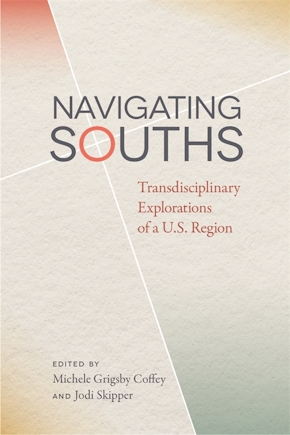This Compost
Ecological Imperatives in American Poetry
Title Details
Pages: 280
Illustrations: 10 illus., 11 figures
Trim size: 6.000in x 9.000in
Formats
Paperback
Pub Date: 09/01/2012
ISBN: 9-780-8203-4419-5
List Price: $34.95
eBook
Pub Date: 09/01/2012
ISBN: 9-780-8203-4480-5
List Price: $34.95
This Compost
Ecological Imperatives in American Poetry
Skip to
- Description
- Reviews
Poetry, for Jed Rasula, bears traces of our entanglement with our surroundings, and these traces define a collective voice in modern poetry independent of the more specific influences and backgrounds of the poets themselves. In This Compost Rasula surveys both the convictions asserted by American poets and the poetics they develop in their craft, all with an eye toward an emerging ecological worldview.
Rasula begins by examining poets associated with Black Mountain College in the 1950s—Charles Olson, Robert Creeley, and Robert Duncan—and their successors. But This Compost extends to include earlier poets like Robinson Jeffers, Ezra Pound, Louis Zukofsky, Kenneth Rexroth, and Muriel Rukeyser, as well as Clayton Eshleman, Gary Snyder, Michael McClure, and other contemporary poets. Walt Whitman and Emily Dickinson also make appearances. Rasula draws this diverse group of poets together, uncovering how the past is a "compost" fertilizing the present. He looks at the heritage of ancient lore and the legacy of modern history and colonial violence as factors contributing to ecological imperatives in modern poetry.
This Compost restores the dialogue between poetic language and the geophysical, biological realm of nature that so much postmodern discourse has sought to silence. It is a fully developed, carefully argued book that deals with an underrepresented element in modern American culture, where the natural world and those who write about it have been greatly neglected in contemporary literary history and theory.
Jed Rasula's insights are fresh and often exciting. This is an important book.
—Guy Davenport
Jed Rasula has written a unique, carefully imbricated, and rewarding book that takes part in the poetic tradition it describes. This Compost is the first fully developed, carefully argued attempt at 'Green theory' in relation to American poetry.
—Paul Naylor, author of Poetic Investigations: Singing the Holes in History
This collage of American poetries proves to be a fertile ground for poetic investigation. . . . Rasula is a fine poet as well as a gifted scholar. As a result, his study reads as a long poem, taking the reader to places only poets have traveled.
—Choice
A remarkable cross between scholarly study, literary anthology, and extended essay . . . A stimulating and useful exploration of environmental themes in American poetry, This Compost is an important contribution to the growth in explorations of what the journal Ecopoetics refers to in its masthead as the ‘creative-critical edges’ between poetry and ecology, or ‘the theory and praxis of deliberate earthlings.’ . . . [Rasula] convincingly explores the uninterrupted tissue of text, flesh and earth.
—ISLE
This Compost is essential reading for those interested in ecopoetics. . . . The exploratory subjectivity of This Compost offers needed corrective to the sanitized, odorless, shrinkwrapped pastoral of nimby 'environmentalism'—as, rather than focus on 'nature,' Rasula emphasizes the 'need to reckon our own wild natures into any consideration of "nature" as such.' It also makes for damned good reading. Remember that, since the author has not aerated this compost pile, leaving that up to us, it is particularly hot—stir well and use sparingly.
—Ecopoetics
I've enjoyed, and learned a lot, from a very recent book, Jed Rasula's This Compost: Ecological Imperatives in American Poetry. . . . In terms of literature-and-nature, it picks up where Lawrence Buell's instructive book (The Environmental Imagination) left off and goes way into the territory of both ecology (in the most precise sense) and the adventurous side of contemporary politics.
—ISLE
Rasula has done the admirably poetic thing of making his meter match his meaning, employing an exceedingly unconventional form for an academic book, but one which fits his subject and prose style well. . . . Overall, Rasula's book opens up a wide area for discussion of the relationship, if one exists, between 20th-century American poetry and the field of ecocriticism.
—Virginia Quarterly Review
Illuminating of each bit of poetry in its connections to the others, empathic without lapsing into hagiography, critically humble, it is a convincing demonstration that a way of reading in which we ‘uncenter our minds from ourselves / . . . unhumanize our views a little,’ as Jeffers puts it in Credo, is not only truer to texts concerned to do the same thing, but better, and worth emulating in our extended community of words.
—Contemporary Literature



